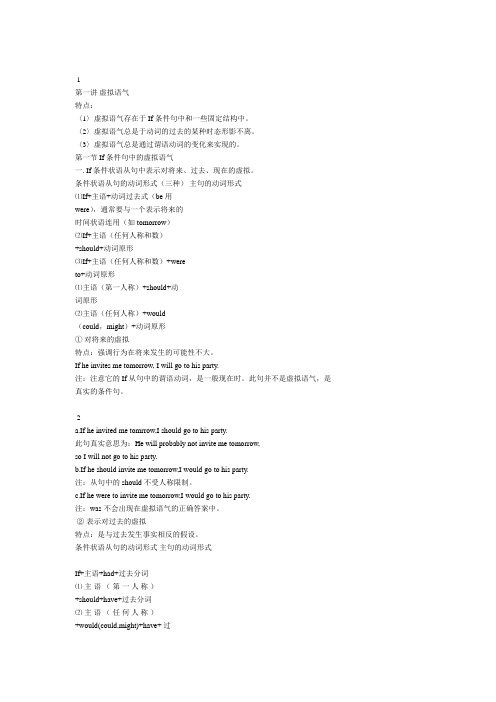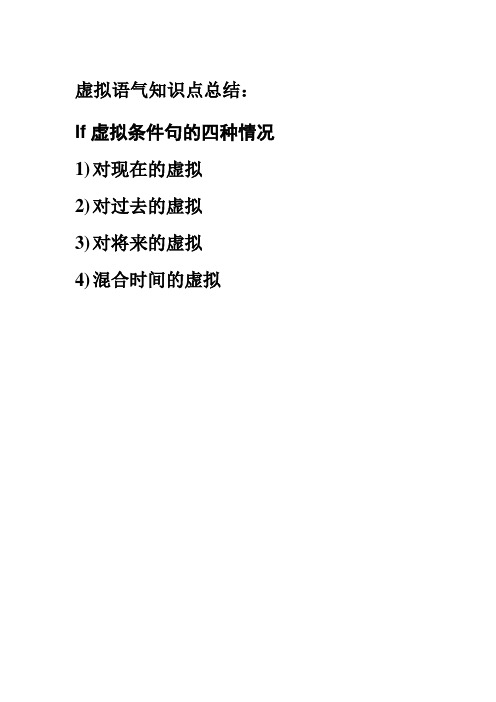专升本虚拟语气讲解共48页
- 格式:ppt
- 大小:4.10 MB
- 文档页数:48

引言概述:虚拟语气是汉语中一个复杂且重要的语法现象,它起到了表达非真实语境或虚假假设的作用。
在专升本考试中,对于虚拟语气的理解和运用将是一个关键考点。
本文将深入探讨专升本虚拟语气的讲解,包括它的定义、用法、特点以及与其他语法现象的关系。
正文内容:一、虚拟语气的定义1.1虚拟语气的概念1.2虚拟语气的分类1.2.1虚拟语气的分类依据1.2.2虚拟语气的具体分类二、虚拟语气的用法2.1表达假设和虚拟情况2.1.1表达与现实相反的情况2.1.2表达与过去事实相反的假设2.2表达建议和命令2.2.1表示请求、命令或建议的虚拟语气2.2.2表示禁止或建议的虚拟语气2.3表达推测和愿望2.3.1表达根据推测的虚拟语气2.3.2表达愿望或要求的虚拟语气三、虚拟语气的特点3.1虚拟语气的语气特征3.2虚拟语气的句法特点3.2.1虚拟语气的从句结构3.2.2虚拟语气的主句结构3.3虚拟语气的语用特点3.3.1虚拟语气的委婉性3.3.2虚拟语气的有礼性四、虚拟语气与其他语法现象的关系4.1虚拟语气与时态的关系4.2虚拟语气与语气的关系4.3虚拟语气与主谓一致的关系4.4虚拟语气与情态动词的关系4.5虚拟语气与其他从句的关系五、虚拟语气的运用技巧5.1注意虚拟语气的语法变化5.2运用虚拟语气来表达情感和态度5.3学习虚拟语气的常用固定搭配5.4注意虚拟语气的语境和语义5.5多做习题和阅读,提升对虚拟语气的把握能力总结:通过对专升本虚拟语气的讲解,我们可以看到虚拟语气在汉语中的重要性和广泛运用。
掌握好虚拟语气的定义、用法、特点以及与其他语法现象的关系,对于专升本考试中语法的理解和应用都将起到至关重要的作用。
因此,我们要注重学习和掌握虚拟语气,并通过不断的练习和阅读提高对虚拟语气的应用能力。
希望本文对您在专升本考试中的语法复习有所帮助。

1第一讲虚拟语气特点:〈1〉虚拟语气存在于If 条件句中和一些固定结构中。
〈2〉虚拟语气总是于动词的过去的某种时态形影不离。
〈3〉虚拟语气总是通过谓语动词的变化来实现的。
第一节 If 条件句中的虚拟语气一. If 条件状语从句中表示对将来、过去、现在的虚拟。
条件状语从句的动词形式(三种)主句的动词形式⑴If+主语+动词过去式(be 用were),通常要与一个表示将来的时间状语连用(如tomorrow)⑵If+主语(任何人称和数)+should+动词原形⑶If+主语(任何人称和数)+wereto+动词原形⑴主语(第一人称)+should+动词原形⑵主语(任何人称)+would(could,might)+动词原形①对将来的虚拟特点:强调行为在将来发生的可能性不大。
If he invites me tomorrow, I will go to his party.注:注意它的If 从句中的谓语动词,是一般现在时。
此句并不是虚拟语气,是真实的条件句。
2a.If he invited me tomrrow,I should go to his party.此句真实意思为:He will probably not invite me tomorrow,so I will not go to his party.b.If he should invite me tomorrow,I would go to his party.注:从句中的should 不受人称限制。
c.If he were to invite me tomorrow,I would go to his party.注:was 不会出现在虚拟语气的正确答案中。
②表示对过去的虚拟特点:是与过去发生事实相反的假设。
条件状语从句的动词形式主句的动词形式If+主语+had+过去分词⑴主语(第一人称)+should+have+过去分词⑵主语(任何人称)+would(could,might)+have+ 过去分词If he had invited me yesterday,I would have been to his party.过去完成时过去将来完成时此句真实意思为:He didn’t invite me yesterday,so I didn’t go to his party.If I had accepted your advice last year,I would have been a college student.③表示对现在的虚拟3注:是与现在发生事实相反的假设。

虚拟语气知识点总结:If虚拟条件句的四种情况1)对现在的虚拟2)对过去的虚拟3)对将来的虚拟4)混合时间的虚拟5)具体运用If虚拟条件句的省略和倒装If引导的虚拟条件句中,如果出现了were, had, should, 则需将if省略,把were, had, should 提前;如果有否定词not, not留在原地,位置不发生变化。
虚拟语气的八种运用下列单词的动词,形容词,名词词性所引导的从句中,谓语动词用should+动词原形,should 可省略1)demand, suggest(建议), insist(坚持要求), order, propose, require, request,command, recommend, decide, ask2)necessary, important, essential,advisable, strange, desirable(值得有的,合意的), vital, ordered, suggested,decided, arranged, proposed,recommended, demanded3)suggestion, proposal, order, instruction,advice, request, demandwish1)与现在相反,从句动词用过去式Iwish I were as young as you.2)与过去相反,从句动词用过去完成式Iwished I hadn’t made that mistake.3)与将来相反,从句动词用过去将来式We wish we could fly to the Mars in thefuture.if only1)用法同wish2)与only if的区别A.Only if: 决不。
除非。
;(rather formal) used to state the onlysituation in which something canhappenB.I’ll come only if you promise me thatyou won’t invite Tom.Only if a teacher has given permissionis a student allowed to leave the room. would rather/sooner1)与现在或将来相反,从句动词用过去式I would rather I went now.2)与过去相反,从句动词用过去完成式Iwould rather you had left yesterday.as if/though1)与现在事实相反,从句动词用过去式She looks as if she were sick.2)与过去事实相反,从句动词用过去完成式He talked about Tom as if hehad seen him.3)与将来事实相反,从句动词用过去将来式It looks as if it might rain.It is (about/high) time + that 从句从句中谓语动词用过去式。

(完整版)虚拟语⽓详解虚拟语⽓详解虚拟语⽓表⽰说话⼈的主观愿望(往往与客观事实相反),或是表⽰假象和猜测。
虚拟语⽓⽆论从形式上还是时态上都⽐较复杂,需要归类记忆。
虚拟语⽓⼤体分为三类:(1) be型虚拟(2) were型虚拟(3) if 条件句及主句虚拟下⾯会详细说每种虚拟形式的特征和规律,考试时先判断属于哪种虚拟类型,剩下的皆是套路~(1)be型虚拟(基本是套路)形式:should + 动词原形,should可以省略⽤法:1)表⽰“命令、建议、要求”等意义词语之后的宾语从句⽤be型虚拟,常见的词如下: demand, desire, insist, order, ask, command, propose, recommend, suggest, prefer, require, request等最常见的形式是这类动词后⾯接着⼀个宾语从句,则宾语从句的谓语部分要⽤(should)+ 动词原形来虚拟例: We demand that the meeting(should)be postponed.The manager suggested that we (should) work together.注意:有时候你所见到不⼀定是上述动词引导的宾语从句,⽽是由上述词变体后所引导主语从句(it做形式主语,如:it is advised/ suggested/ requested/ ordered/ proposed that…)、表语从句或同位语从句例如:It is required that the students (should) learn a foreign language. (主语从句) The requirement is that all the equipment in the meeting room (should) be checked twice before. (表语从句)We didn’t stand for his proposal that the meeting (should)be postponed. (同位语从句)只要看到句中有上述动词或其变体,不管词性怎么变、句型怎么变,都⽤be型虚拟!特例:suggest和insist这两个⽐较特殊,当suggest作“暗⽰、表明、说明”讲,insist作“坚持说”讲,后⾯⼀般跟的是客观事实,不需要虚拟~这是⼀个⽐较重要的考点,体会下⾯两组句⼦:We all suggest that a lab (should) be built. 我们都建议建⼀个实验室。

专升本虚拟语气讲解在专升本英语的学习中,虚拟语气是一个比较重要且具有一定难度的语法点。
虚拟语气用于表达假设、愿望、建议、命令等非真实的情况,它的形式和用法较为复杂,但只要我们理解了其中的规律,就能轻松应对。
首先,我们来了解一下虚拟语气在条件句中的应用。
条件句分为真实条件句和虚拟条件句。
真实条件句表示现实中可能发生或已经发生的情况,比如“If it rains tomorrow, I will stay at home” 这里的“rains”是一般现在时,表示一种可能的真实情况。
而虚拟条件句则表示与现实相反或不太可能发生的情况。
在与现在事实相反的虚拟条件句中,从句的谓语动词用过去式(be动词用 were),主句的谓语动词用“would / could / should / might+动词原形”。
例如:“If I were you, I would take this job” (如果我是你,我会接受这份工作。
)这里用“were”而不是“was”,因为在虚拟语气中,be 动词一律用 were。
与过去事实相反的虚拟条件句中,从句的谓语动词用“had +过去分词”,主句的谓语动词用“would / could / should / might + have +过去分词”。
比如:“If he had studied harder, he would have passed the exam” (如果他学习更努力些,他就会通过考试了。
)与将来事实相反的虚拟条件句,从句的谓语动词有三种形式:“were to +动词原形”、“should +动词原形”、“过去式”,主句的谓语动词用“would / could / should / might +动词原形”。
例如:“If it were to rain tomorrow, we would not go for a picnic” (如果明天下雨,我们就不去野餐了。

专升本虚拟语气的用法归纳虚拟语气在专升本英语考试中是一个重要的语法点,其用法可以归纳如下:1. 虚拟现在时:表示与现在事实相反的情况。
从句用“if+主语+动词的过去式(be 动词用were)”,主句用“主语+would+动词原形”。
例句:If I were you,I would take an umbrella. 如果我是你,我就会带把伞。
2. 虚拟过去时:表示与过去事实相反的情况。
从句用“if+主语+had+过去分词”,主句用“主语+would+have+过去分词”。
例句:If you had come yesterday,you would have seen him. 如果你昨天来了,你就会看见他。
3. 虚拟将来时:表示与将来事实相反的情况。
从句用“if+主语+would/might/could+动词原形”,主句用“主语+would/might/could+动词原形”。
例句:If you might leave now,I would be able to finish the work before dark. 如果你现在离开,我能在天黑之前完成工作。
4. 含蓄虚拟语气:从句用介词短语、副词或非谓语动词来表示,主句不用虚拟语气。
例句:One can’t succeed without hard work. 没有努力就不能成功。
(without hard work=if there were no hard work)5. 混合虚拟语气:一个句子中主句和从句分别表示对现在、过去或将来的虚拟。
例句:I would write to her if I had your address. 我要有你地址的话,我会给她写信的。
(从句与现在事实相反,主句与过去事实相反)在考试中,注意审清题目的要求,细心分析语境,合理判断时态和语态的使用。
以上内容仅供参考,如需更多关于虚拟语气的用法归纳,可以查阅专升本英语教辅练习书获取更全面和准确的信息。
专升本虚拟语气虚拟语气(6个点)要点1三种假设had done(if引导的非真实条件句)would/should/could/might+ have done (主句) ※前后都表过去If you (keep) ____ on doing that last month, you would have succeeded. had kept 06年真题2013年真题44. If he (take) _____ my advice at that time, he would have got the job he applied for. had takenBe—were (非真实条件句) Do—didwould/could/might/should+动词原形(主句)If I were you, I would study hard.If I had time now, I would go out.were to+动词原形 (if从句) should+动词原形would/could/might/should+动词原形(主句)If I were to have time tomorrow morning, I would stay at home.要点2 if的省略如果if 从句中有were/should/had, if可省,were/should/had提到主语之前Were I you, I would study hard.要点3以下5种情况用“(should)+动词原形”的虚拟语气情况一:表建议、命令、要求等动词后的中move建议propose提议,建议-proposal(名)insist坚决要求suggest建议;暗示(宾从用陈述语气)His pale face suggests that he (be) ____ ill. isDon’t worry about her. Her rosy cheeks suggest that she ___ in good health.08年真题A) be B)isC) were D) was情况二:It be +引起虚拟形容词或表建议、命令、要求等动词的过去分词+常考引起虚拟的形容词:advisable可行的;important;desirable合心意的;essential基本的,strange奇怪的,natural自然的,vital非常重要的,urgent紧急的,necessary 必要的表建议、命令、要求等动词的过去分词:required, suggested, recommended, requested, ordered…2013年真题It is important that we ___ the task ahead of time. A.will finish B. finished C. finish D. shall finish情况三:表建议、命令、要求,愿望、主张等名词后的表语从句或同位语从句order, request, requirement, proposal, advice, recommendation, demand, suggestion, necessity, desire, idea……情况四动词+it(形宾) +引起虚拟的形容词(宾补)+宾从【(should)+动词原形】情况五:in case (以防);for fear that=lest唯恐,其后的从句中※注意事项:1)should+动词原形2)动词原形:am/is/are/was/were—be (动词原形)实义动词原形指的是动词未做任何改变(不受主语和时态的制约)It is important that he (finish) _____ the task we have given him today. finish06年真题He suggested that Mary (finish) ___ her homework on time.We propose that he (be)____ at home on weekends.※3)主谓关系:主动关系被动关系(be +过去分词)Our teacher suggested that our homework (hand) ___ in before Friday. be handedbe+形容词=be of+名词The book is very useful. The book is ___ ___ ___.Of great useHe required that we (present) ____ at the meeting on time. be presentHe put forward a (propose) ___ at the meeting. Propose-proposal (名)要点4以下5种情况时态根据需要后退一个情况一该是…时候了a. It is time for+名词b. It is time to do…c. It is (about/high) time+句子It is time we took effective measures to stop air pollution.2009年真题It’s high time we ___ something to stop road accident.A. didB. are doingC. will doD. do情况二wish+宾从(假设,用虚拟语气)情况三would rather+句子(现在或未来时间状语,用一般过去时;过去时间状语,用过去完成时)be involved inbe involved inmake comment on…对…进行评论情况四If only(但愿,要是…多好!)+句子If only I (not lose) ___ my wallet yesterday!had not lost情况五as if=as though+句子(假设,如用be的过去式,无论主语是什么,用were)The little Chinese boy speaks English very well as if he (be) ___ an American. wereThe milk tastes as if it (be) __ sour. is要点5时间上混合的虚拟语气If I had slept a little earlier last night, I would not feel sleepy now.要点6Besides (learn) ___ English, I also learn Japanese. Despite=in spite of尽管+名词/the fact that 句子………, I still went to school as usual.1. Despite=In spite of my illness2. Despite=In spite of the fact that I was ill3. Although I was ill1)介词等暗示出非真实条件with, without, but for___ their help, I could have succeeded in the experiment yesterday.A. But forB. DespiteC. Because ofD. In case of2)but; or/or else/otherwise 可暗示出非真实条件句。
语气英语的动词一般可带有三种不同的语气:陈述语气,祈使语气和虚拟语气。
不同的语气用动词的不同形式(有的还借助句法形式)来表示。
虚拟语气虚拟语气的概念�虚拟语气是一种特殊的动词形式,一是用来表示说话人所说的话不是一个事实,而是一种假设、猜测、怀疑等(在条件从句中或让步状语从句中);一是表示说话人的愿望、要求、命令、建议等 (在宾语从句、表语从句、同位语从句)。
使用虚拟条件句要注意的几点:1. 当条件状语从句表示的行为和主句表示的行为所发生的时间不一致时,被称为:错综时间条件句“,动词的形式要根据它所表示的时间作出相应的调整.If you had followed my advice , you would be better now.如果你听我的建议,你现在就会痊愈了.If you had studied hard before, you would be a college student now.如果你努力学习的话,你现在就会是大学生了.2.用于表示命令、建议、要求等一类词后面的宾语从句。
insist, order, command, suggest, advise, propose, require, request, demand, desire etc.We suggested that the meeting (should) be put off. They insisted that the boy (should) go with them.注意:suggest 当表示“暗示、表明“讲时,insist 表示”坚持认为“之意时,应用陈述语气。
The smile on his face suggested that he was satisfied with our work.他脸上的表情表明他对我们的工作很满意.The man insisted that he had never stolen the money.那个人坚持说他没有偷钱.It is important (necessary, strange, natural)B. 在It is demanded/suggested/ordered/required…. that-clause句型中从句用(should )+动词原型It is demanded that we should work out a plan.C. 在It is a pity/a shame/ no wonder thatIt is a pity/a shame/ no wonder that……..句型中从句也常用(should )+动词原型It It’’s a pity that you (should) miss a good chance.四情态动词+ have donecould have done 本来可以- - -might have done 本来可能- - -should / ought to have done 本来应该做- - -shouldn’’t / ought not to have done 本不该做- -shouldn你本不应该告诉她真相。
虚拟语气语气和时态、语态一样,是动词的一种形式,表明说话的目的和意图。
英语中有四种语气:陈述语气、疑问语气、祈使语气和虚拟语气。
陈述语气:表示谓语动词所表达的动作或状态是符合客观事实的,也就是把动作或者状态当做事实表达出来或者提出一种看法。
疑问语气:用来提出问题或询问情况的语气。
祈使语气:用来向对方提出请求、邀请,给予忠告、指示、警告、命令等的语气。
祈使句中的主语You一般省略,动词也用原型表示.虚拟语气:把动作当做一种只存在于讲话人想象中的“假设”或“推测”,而不是当作客观事实中的真实事件。
它表达的通常是怀疑、忧虑、推测、想象或祝愿。
这里主要讲解虚拟语气的一般语法特征和难点.一、虚拟语气在条件句中的用法条件句分为两种:一种是可能实现的,一种是无法实现的,可能实现的条件句叫真实条件句,不能实践的就是虚拟条件句。
1. 真实条件句:这种条件句实现的可能性非常大。
这类条件句常用if, unless, once, as long as等引导。
Eg。
If you have any doubts about our plan, I’ll stop it. 如果你对我们的计划有怀疑,我会立刻终止它。
The secretary will get a pay raise as long as she does her job well. 这个秘书会得到加薪,只要她好好工作。
2. 虚拟条件句:往往指不能实现的或者纯假设的情况,可以对过去、现在或者将来的情况进行假象。
在这三种情况中,主句和从句中的动词也有不同的形式.A. 与现在情况相反:表示对当前不可能实现的情况的假想,此时从句用一般过去式(did sth./ were。
.。
),主句用过去将来式(would/ shoud/ could/ might do sth.):Eg. If I were you, I would choose to work in a small town. 如果我是你,我会选择在小镇工作。
助力专升本虚拟语气讲义(上)虚拟语气知识点1名词性从句中的虚拟语气:(S h o u l d)+d o(1)虚拟语气在宾语从句中的用法在某些动词后面所跟宾语从句中要用虚拟语气,用来表示建议、命令和要求等,这时从句中的谓动词的形式为:s h o u l d+动词原形,s h o u l d可以省略。
常用动词一个坚持i n s i s t一个想要d e s i r e一个宁愿p r e f e r一个推荐r e c o mme n dd e s e r v e值得提及两个命令:o r d e r,c o mma n d三个建议:a d v i s e,s u g g e s t,p r o p o s e四个要求:d e ma n d,r e q u i r e,r e q u e s t,a s ke.g.We s u g g e s t e d t h a t T o m(s h o u l d)h a v e a r e s t.H e i n s i s t e dt h a t I(s h o u l d)b e p r e s e n t.T h e k i n go r d e r e dt h a t t h e p r i s o n e r s(s h o u l d)b e k i l l e d t h e n e x t d a y.T h e y r e q u e s t e d t h a t w e(s h o u l d)s e n d t h e m t o w o r k t h e r e.【注意】①i n s i s t意为“坚持某种动作”才用虚拟语气;意为“坚持某种观点,某个事实”则不用虚拟语气。
e.g.H e i n s i s t s h e i s a s t u d e n t.他坚持说他是个学生。
②s u g g e s t意为“建议”才用虚拟语气,意为“暗示”则不用虚拟语气。